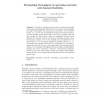Free Online Productivity Tools
i2Speak
i2Symbol
i2OCR
iTex2Img
iWeb2Print
iWeb2Shot
i2Type
iPdf2Split
iPdf2Merge
i2Bopomofo
i2Arabic
i2Style
i2Image
i2PDF
iLatex2Rtf
Sci2ools
104
click to vote
EOR
2008
2008
Maximizing throughput in queueing networks with limited flexibility
We study a queueing network where customers go through several stages of processing, with the class of a customer used to indicate the stage of processing. The customers are serviced by a set of flexible servers, i.e., a server may be capable of serving more than one class of customer and the sets of classes that the servers are capable of serving may overlap. We would like to choose an assignment of servers that achieves the maximal capacity of the given queueing network, where the maximal capacity is if the network can be stabilized for all arrival rates < and cannot possibly be stabilized for all > . We examine the situation where there is a restriction on the number of servers that are able to serve a class, and reduce the maximal capacity objective to a maximum throughput allocation problem of independent interest: the Total Discrete Capacity Constrained Problem (TDCCP). We prove that solving TDCCP is in general NP-complete, but we also give exact or approximation algorith...
Related Content
| Added | 10 Dec 2010 |
| Updated | 10 Dec 2010 |
| Type | Journal |
| Year | 2008 |
| Where | EOR |
| Authors | Douglas G. Down, George Karakostas |
Comments (0)

